 |
| Flex hoses in a jet engine |
Several months ago, when I started this blog, I put
product knowledge at the top of the list of necessary attributes for a successful salesperson.
I want to re-address this issue.
A customer that I'm familiar with lost an order for an air compressor recently because he said "the end user wanted rigid pipe connections on his compressor rather than flexible hose". Our compressor had flexible hose and the salesperson did NOT have enough product knowledge to overcome the objection.
Our lives are surrounded by flexible hose of all types. There are thousands of flexible hose connections in a jet engine; tens of thousands of flex hoses in a Apollo rocket. Flexible hoses (usually a corrosion resistant interior liner surrounded by wound stainless steel braiding) are everywhere--look under your toilet at the connection to the water inlet.
Why are flex hoses so prevalent? Two reasons: They're easier to install than rigid. And because they can absorb shock and vibration better than rigid pipe--flex absorbs, rigid pipe cracks.
We all know that rocket engines and jet engines vibrate, sometimes rather dramatically, so flex is a natural solution.
But air compressors vibrate and therefore, flex hose is a better option than rigid pipe.
Customers may want a particular configuration on a product you sell. That configuration may not be an appropriate one. The salesperson's job is to explain the issues to the customer, to explain why his product is better than the competitor's.
In my mind, a salesperson without product knowledge is not a true salesperson.
An order taker is
"transactional": take the order, give the customer what he asks for, and don't try to educate the customer on why he may be wrong.
Take the time to understand your product. Take the time to understand your competitor's product. Understand why your manufacturer's design may be different and use that difference to sell your product. Don't be an "order taker". Learn your product, right down to the little components that make your product different and better.




 We go through our sales day not really thinking about the details--the little things--about the customer's issues and personality, about his business, about little things in his office that display his personality, etc. Let's take a lesson from Bill Belichick, New England Patriots coach. This is from an article by Kevin Duffy, published on MassLive.com December 16, 2016 (emphasis is mine):
We go through our sales day not really thinking about the details--the little things--about the customer's issues and personality, about his business, about little things in his office that display his personality, etc. Let's take a lesson from Bill Belichick, New England Patriots coach. This is from an article by Kevin Duffy, published on MassLive.com December 16, 2016 (emphasis is mine): 






